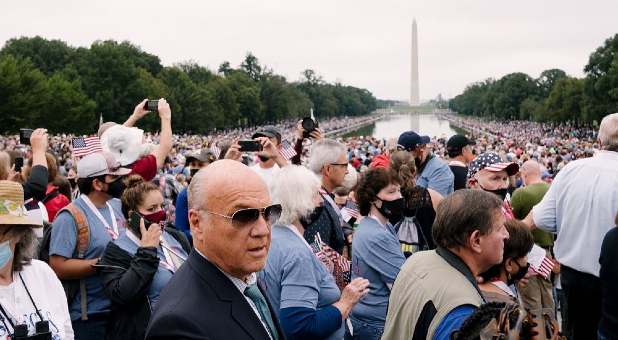Spike in Prominent Leaders’ Positive COVID-19 Tests
Since President Donald J. Trump announced his positive COVID-19 test, more reports are being released showing the spread of the virus among prominent Christian leaders.
Yesterday Washington correspondent for New York Magazine Olivia Nuzzi, tweeted the confirmed-positive test of Pastor Greg Laurie of Harvest Christian Fellowship.
NEWS: @NYMag has confirmed that Pastor Greg Laurie of Harvest Christian Fellowship in Riverside, California has tested POSITIVE for COVID-19. Pastor Laurie was at the Prayer March on the Mall with Mike Pence and Franklin Graham and the ACB Rose Garden event later that day.
— Olivia Nuzzi (@Olivianuzzi) October 5, 2020
After attending Franklin Graham’s Sept. 26 prayer march on the National Mall, Laurie went to the White House for the event in the Rose Garden where Amy Coney Barrett was nominated by President Trump for the U.S. Supreme Court.
Multiple visitors to the White House have since shared positive test results. White House Press Secretary Kayleigh McEnany along with Principal Assistant Press Secretary Chad Gilmartin and Assistant Press Secretary Karoline Leavitt have all tested positive, according to ABC News.
John Hagee, senior pastor of Cornerstone Church in San Antonio, Texas, tested positive Friday, Oct. 2. In a Facebook announcement, Hagee’s son Matt updated the congregation on both his father’s positive test results and his favorable condition.
Minnesota Senate Majority Leader Paul Gazelka tested negative after his meeting with President Trump at the airport last week. According to the Star Tribune, Gazelka will limit activities and retest later this week.
CDC reports updated weekly show 8% of tests in the U.S. have come out positive with Florida and Texas among the highest-ranking states.
When the coronavirus first appeared in the U.S. in early 2020, it started with a small number of infected people, so it took longer to spread.
A second wave could start with unknowing coronavirus carriers in many areas, and the risk of transmission increases when people spend more time together indoors, which is more common in the fall and winter months.
Infectious disease experts at The Johns Hopkins University want to know when the population will develop herd immunity to COVID-19, as happened with the 1918 flu and H1N1 flu.
The public health term “herd immunity” refers to when enough people in a community have developed immunity from a disease thereby protecting the community from future outbreaks.
The Johns Hopkins University experts explain that about 70% of the population needs to be immune to this coronavirus before herd immunity takes effect. People may be immune from the coronavirus if they have already had it, but reports have not confirmed this yet. A widely available, safe and effective vaccine may not be available for many months.
Until that time, the best way to slow the spread of COVID-19 is to follow the safety and social distancing regulations medical authorities have recommended: washing your hands often, avoiding large crowds and staying home when not feeling well, according to the Mayo Clinic. {eoa}




























































